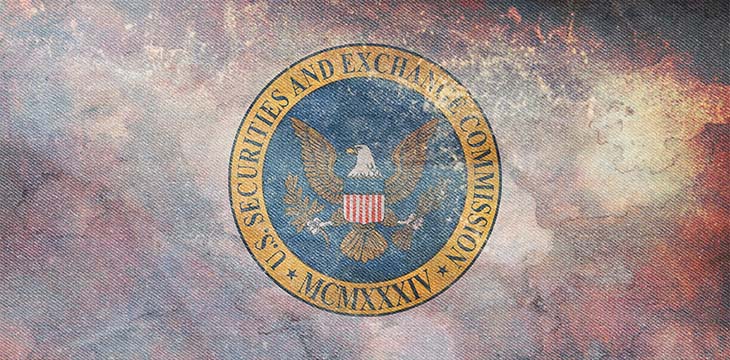|
Getting your Trinity Audio player ready...
|
Gary Gensler, chairman of the U.S. Securities and Exchange Commission (SEC), addressed the Penn Law Capital Markets Association at the University of Pennsylvania on Monday, reiterating the same SEC commitment to regulating digital asset trading platforms which has marked his tenure so far.
The thrust of Gensler’s address may be already self-evident to many: that current laws already apply to digital assets regardless of how novel the technology may be.
“There’s no reason to treat the crypto market differently just because different technology is used. We should be technology-neutral,” he said.
Gensler spoke at length about his concerns over digital asset exchanges, remarking that the market for exchanges is ‘highly concentrated,’ with the top five platforms accounting for 99 percent of all digital asset trading, with just two (Binance and Coinbase) making up 80 percent of trading.
Perhaps most relevant—and most indicative of things to come—is what Gensler said next:
“These platforms likely are trading securities….While each token’s legal status depends on its own facts and circumstances, given the Commission’s experience with various tokens that are securities, and with so many tokens trading, the probability is quite remote that any given platform has zero securities.”
Any platform that offers trading of securities must be registered as a securities exchange with the SEC and comply with its rigorous consumer protection requirements. Therefore, any exchange that fails to do this—as well as any issuer of digital asset securities—is acting unlawfully.
This isn’t a new position for the SEC or Gensler, who has spent much of his tenure speaking on exactly this topic. In 2021, he told CNBC that the securities regulator considers that many digital assets currently on the market qualify as securities under the Howey test and repeated his predecessor’s sentiment that he “really hadn’t seen many tokens that didn’t meet that securities test.”
Indeed, digital asset exchanges have come under long-overdue scrutiny under Gary Gensler’s tenure, which began in early 2021. Since the SEC’s first digital asset enforcement action in 2013, the agency has brought a total of 97 enforcement actions, according to economic and financial consultancy Cornerstone Research. Twenty of these enforcement actions took place in Gensler’s first year in office.
For example, earlier this year, BlockFi agreed to pay a $100 million penalty to the SEC and 32 U.S. states over its failure to register its digital asset lending product as required under U.S. securities laws.
In Gensler’s latest speech, he outlined the direct steps that his agency is taking to ensure digital asset exchanges are properly regulated. Chief among these is forcing these platforms to submit to the same regulatory requirements as any other exchange—in other words, treat the digital asset exchanges exactly like the already highly-regulated stock trading platforms.
The chairman also remarked on the prevalence of digital asset thefts (the chairman cited $14 billion worth of value stolen in 2021) and said that he had asked his staff to explore how to ensure platforms protect their customer’s assets and in particular whether it would be appropriate to segregate custody of assets held on exchanges.
Gensler also paid some attention to stablecoins, saying that they raise important policy issues. In particular, he commented on the potential for adverse impacts on financial stability owing to their dubious backing.
“Stablecoins are so integral to the crypto ecosystem that a loss of the peg or a failure of the issuer could imperil one or more trading platforms, and may reverberate across the wider crypto ecosystem,” he said.
Though he didn’t highlight any stablecoin, the backdrop for Gensler’s comments is a rapidly growing conversation around the biggest stablecoin, Tether (USDT) and the lack of transparency with regard to its self-alleged fiat backing—which looks more doubtful every day that Tether remains unaudited.
Gensler also linked the recent explosion in ‘crypto’ advertisements, such as that seen in this year’s Super Bowl, to those produced by subprime mortgage lenders in the lead-up to the 2008 economic crash.
“In February, you all might have noticed Super Bowl ads for several crypto platforms,” he said.
“This wasn’t the first time we’d seen some new innovations getting air time on the biggest TV event of the year.”
“Seeing these ads reminded me that, in the lead-up to the financial crisis, subprime lender AmeriQuest advertised in the Super Bowl. It went defunct in 2007. A few years before that, according to Axios, ‘Fourteen dotcom companies advertised during the 2000 Super Bowl, most of which are now defunct.’”
Though the chairman covered broad ground, the central message of his address was clear: the SEC considers that the digital asset industry falls within its remit and the existing laws apply to digital asset exchanges and issuers the same way they would to more traditional entities.
This puts yet another pin in attitudes like those revealed in comments by Sam Bankman-Fried, the notorious CEO of controversial crypto exchange FTX. Bankman-Fried expressed dissatisfaction with the SEC’s attempt to apply well-established rules of investor protection to ‘crypto.’
Gensler’s latest address, particularly his comments on stablecoins, is likely to incense Bankman-Fried further, as Bankman-Fried’s company Alameda Research was revealed as the lone recipient of nearly a third of all USDT ever printed. It seems that Bankman-Fried’s exchange may be exactly the kind of reverberation Gensler warned about when the stablecoin music finally stops.
As Gensler said:
“We already have robust ways to protect investors trading on platforms,” he said.
“And we have robust ways to protect investors when entrepreneurs want to raise money from the public.
“We ought to apply these same protections in the crypto markets. Let’s not risk undermining 90 years of securities laws and create some regulatory arbitrage or loopholes.”
Watch: CoinGeek New York panel, The Future of Digital Asset Trading

 02-14-2026
02-14-2026 




